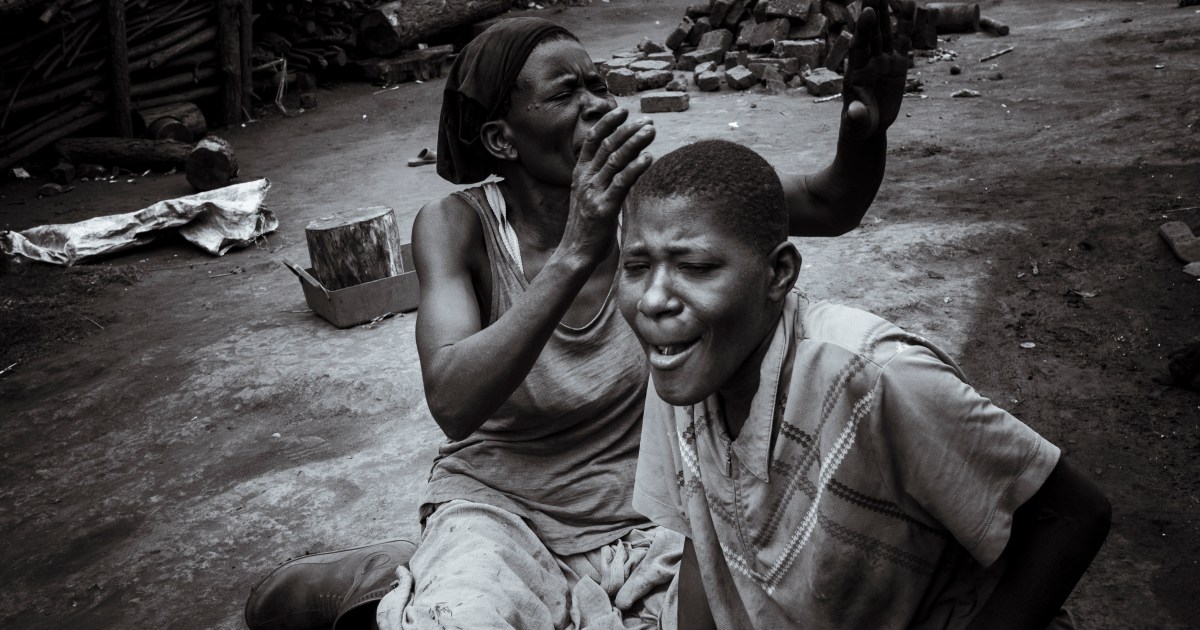“Unless God intervenes, he will die like this.”
While the outcome of Robinsa’s case is a landmark step forward for the rights of Ugandans living with intellectual disabilities, it remains unclear what support other families like the Otleys will have access to, or if they will be able to access it at all.
About 200 kilometers northeast of Perez’s home, where the landscape changes from lush, moist jungle to barren, rocky plains, separated by the shallow, swampy Lake Kyoga, lies the main commercial city of Soroti (population 60,900). Five kilometers northwest of the city, dust-red cornfields stretch out on either side of a deeply rutted road that leads to the village of Ochomai, where eucalyptus trees provide shade and local taxi drivers wait shirtless in the scorching sun to wash their motorbikes, or “boda-bodas,” as they’re colloquially called.
It’s an agricultural area, and residents cultivate fields of sorghum, corn, sesame, and peanuts. Moses Otarai is one of those farmers. He’s the father of four, and his second son, Sam, is 20. The family property has three huts: one for Moses and his wife, one for Sam’s siblings, and a shared third where Sam stores firewood and sacks of grain.
Because of Sam’s intellectual disability, Moses has developed a close relationship with the Rev. Fred Alimet, a community outreach worker who spends his time outside of preaching identifying cases of intellectual disability in the Soroti area and referring them to organisations such as Embrace Culture. Today, he is visiting Sam.
After polite greetings and small talk, Moses invites the pastor into his son’s hut and warns him to be careful, as Sam can be unpredictable. Sam’s bed is a large nylon sack usually used to hold sand or soil, placed on a tattered piece of Styrofoam. A tattered mosquito net hangs uselessly from the ceiling.
Sam’s ankles are bound with rough rope, tied to a heavy log, and he cannot move. His once white shirt is now beige with dirt. His face is hollow, his cheeks and forehead disfigured by bumpy protuberances he’s had since birth. His thin, shapeless moustache is a sign of his youth. Fred offers him a bottle of soda, and Sam gets up and downs the fizzy drink in one gulp. He burps and laughs.
 Sam Oterai, 20, is so often violent towards himself, his family and others in the community that his father, Moses, has decided to tie him up for his own safety. [Christopher Hopkins/Al Jazeera]Moses says he ties his son up to protect his family and his community. As his father speaks, Sam’s broad smile turns to a worried glare. In the past, that glare has manifested as violence, first against himself and then against others. Moses explains with dismay: “He starts picking up a stick, and when he picks up a stick, sometimes he hits himself. And then he starts hitting himself, and then we realize he wants to hit other people too. So we see what he does and we tie him up.”
Sam Oterai, 20, is so often violent towards himself, his family and others in the community that his father, Moses, has decided to tie him up for his own safety. [Christopher Hopkins/Al Jazeera]Moses says he ties his son up to protect his family and his community. As his father speaks, Sam’s broad smile turns to a worried glare. In the past, that glare has manifested as violence, first against himself and then against others. Moses explains with dismay: “He starts picking up a stick, and when he picks up a stick, sometimes he hits himself. And then he starts hitting himself, and then we realize he wants to hit other people too. So we see what he does and we tie him up.”
Unlike Perez, Sam has never been diagnosed. Moses had taken him to the hospital in Soroti many times when he was a boy, but his facial deformity was dismissed as a “rash” and his intellectual disability as an “illness.”
Moses says he is desperate for a solution as his family has been all but ostracized by the local community since Sam attacked villagers and was subsequently beaten up by them. Thankfully, so far this has not affected sales of Moses’ produce in his village.
He doesn’t know what to do and feels like “there’s no one who can help Sam or who knows how to look after him.”
His face bears the expression of a man who has given up hope, the fight long gone. “It would be terrible if he died like this, unless God intervenes and makes him well.” [tied up]and I don’t feel good about it,” he says.
In Uganda, the line between abuse and care is blurred when it comes to intellectual disabilities. The use of restraints and seclusion is defined as a human rights violation in Article 5 of the Universal Declaration of Human Rights, yet is widely accepted as a way of managing people with neurological problems. Uganda’s 2019 Mental Health Act still permits the use of ECT (electroconvulsive therapy), seclusion and restraints.
Derrick Kiiza, executive director of Mental Health Uganda, a community-based non-profit that provides local mental health support, said the practice of confining and hiding people with disabilities was driven by “desperation” and a lack of facilities, but added that the government needed to consider a policy shift away from institutional care to a community health service model.
“Policies have to move towards community mental health care so that governments know they can spend less by investing in prevention and promotion than by running a curative system.”

